Everything You Need To Know About How Long Can A Dog Go Without Eating


As pet parents, we have to make sure that our dogs are getting fed on time every day and that they are eating properly. But what happens when you see your dog refusing to touch their food and not eating anything at all for the whole day?
During these times, it is natural for you to ask the question, ‘how long can a dog go without eating?’ and how to make them eat again. Because, after all, dogs can’t open the fridge and make themselves a snack when they get hungry.
You will be surprised to know that while most dogs should eat regularly to stay healthy, they can also go on for a long time without food. Of course, this varies based on factors like age, size, and overall health.
If you want to know more about how long can a dog go without eating or drinking, then this article is for you. We will talk about the feeding habits of dogs, how long a dog can go without eating, and the possible reasons why a dog may not be eating. Let’s begin.
How Long Can Dogs Go Without Eating?
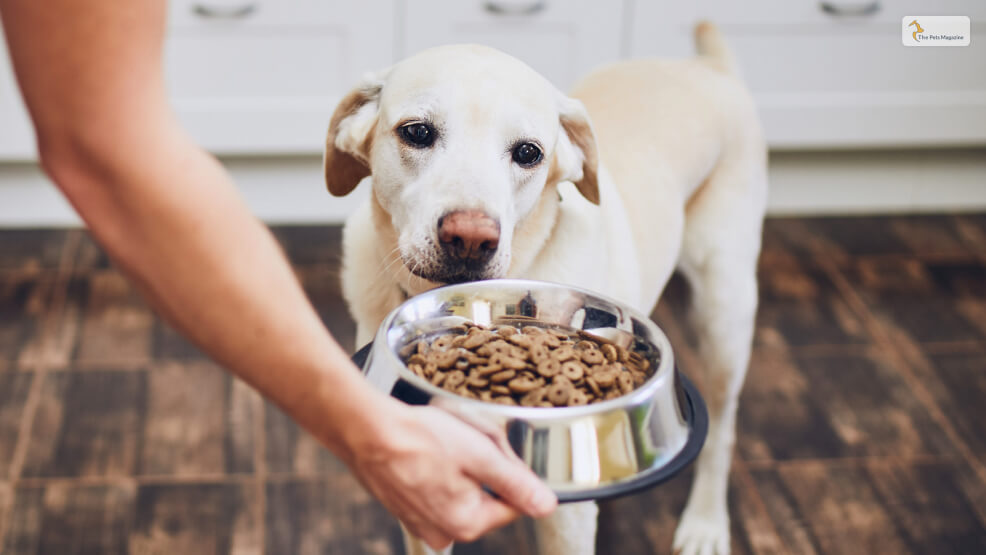
While fasting for short periods is usually fine and even has some benefits, extended periods without food can be dangerous for dogs. But as a general rule of thumb, most healthy adult dogs can go without eating for 3-5 days before they start feeling ill. However, this timeframe is not applicable for puppies, senior dogs, and dogs with medical issues.
Factors That Affect How Long a Dog Can Go Without Food
So, how long can a dog survive without food before you should start worrying? The short answer is that for a typical healthy adult dog, you should not let them go without food for more than 48-72 hours.
Size and age
Smaller dogs and puppies have higher metabolisms and less fat stores, so they can only last a couple of days without food. Larger breeds and senior dogs have more fat to burn, so they can go 3-5 days.
Health
If your dog is sick or has an underlying condition, their body will burn through energy reserves faster. It’s best to consult your vet, but a ill dog may only last 12-24 hours without eating.
Activity level
The more active your dog is, the more calories they need to sustain themselves. Inactive or less active dogs have lower energy needs so can go longer without food.
Access to water
Having access to fresh water is critical. Without it, a dog can suffer dehydration and organ damage in just a couple of days. Always provide your dog with water, even when withholding food.
Extreme Temperature
In extreme temperatures, a dog’s body has to work harder and use more energy to regulate temperature. So, they may only last a day or two without food in extreme heat or cold. Also keep in mind that if you have a working dog performing strenuous activities like pulling a sled or herding, they are burning a lot of fat and need to eat regularly to restore their energy.
The bottom line is if your dog hasn’t eaten for 24-48 hours, contact your vet. Puppies, small or ill dogs should be checked sooner. While healthy dogs can survive for a few days without food, their well-being starts to suffer quickly. It’s always best to get your dog eating as soon as possible to avoid potential health issues.
Why is Your Dog Not Eating: Possible Causes and Reasons
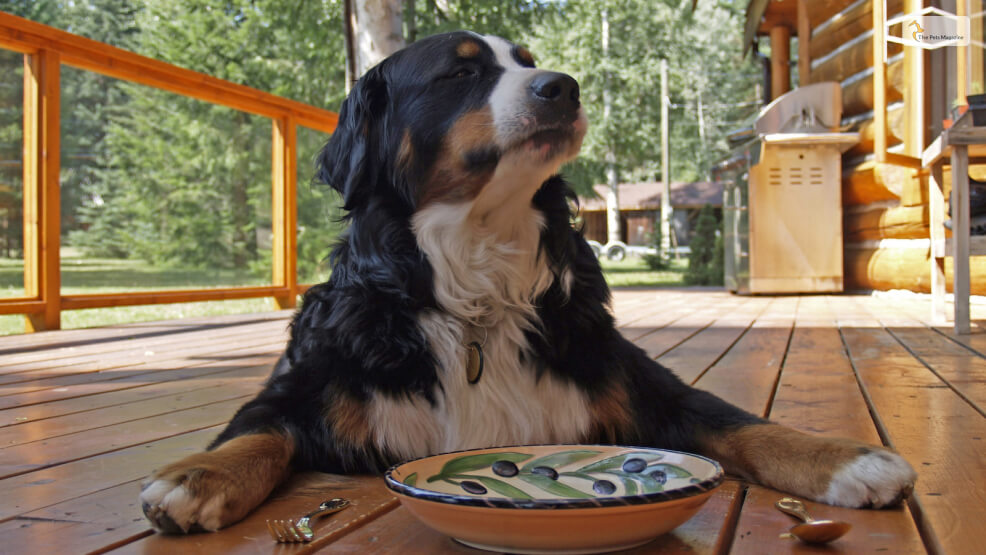
There are several possible reasons why your dog may go off their food.
Medical issue
If your dog suddenly stops eating for more than a day, it could indicate an underlying medical problem and you should take them to the vet. Conditions like gastrointestinal issues, dental problems, kidney disease, or other illnesses can cause loss of appetite in dogs. It’s best to rule out any medical causes first before assuming it’s due to something else.
Stress or anxiety
Is there a new person or animal in the household? Have you recently moved to a new home? Stress and anxiety are common reasons for dogs to skip meals. Try giving your dog some extra love and reassurance to help relieve their stress. You can also try interactive dog toys to keep them stimulated.
Boredom
Some dogs lose interest in their food simply because they’re bored. Switching up your dog’s mealtime routine can help. Try feeding them with interactive dog toys that make them work for their food, or give them puzzle toys that dispense treats. You can also try changing the location of where they eat. Simple changes can make mealtimes exciting again.
Picky eater
If your dog is otherwise healthy, they may just be a picky eater. You can try warming up their food, switching to a more enticing diet, or adding extras like chicken broth, eggs, or wet food to their kibble to make it more appealing. Giving your dog some tough love by sticking to scheduled feeding times can also help address picky eating. Don’t give in by offering lots of treats or table scraps!
With patience and possibly the help of your vet, you can get to the bottom of why your dog’s appetite has changed and get them back to enjoying mealtimes again.
Dangers of Your Dog Not Eating for Extended Periods
Dogs cannot go for extended periods without eating before it becomes dangerous for their health. After a day or two without food, your dog is at risk of:
Hypoglycemia
Low blood sugar can occur quickly in dogs that haven’t eaten, especially for smaller breeds. Signs include lethargy, weakness, and confusion. To treat, rub honey or syrup on the gums and give small amounts of bland food like rice and chicken.
Dehydration
Without food, your dog won’t get enough water either. Dehydration is life-threatening and can cause dry nose and gums, sunken eyes, lethargy, and skin that stays tented when pinched. Provide IV fluids under vet supervision for severe dehydration.
Liver damage
The liver stores nutrients and provides energy when a dog isn’t eating. After 3-5 days without food, the liver can suffer permanent damage or even failure. Vomiting, diarrhea, jaundice and blood in the stool can indicate liver problems. Seek vet care immediately.
Electrolyte imbalance
Important minerals like sodium and potassium are depleted when a dog doesn’t eat. This disrupts fluid balance, nerve and muscle function. An imbalance can lead to weakness, collapse and seizures. IV fluid therapy and electrolyte supplements may be needed.
Not eating for a few days may seem minor, but the health impacts on your dog can be severe. Contact your vet right away if your dog shows symptoms of malnutrition or dehydration, or hasn’t eaten for 3-5 days. They can check for any underlying issues, provide necessary treatments and help get your dog back to full health. The sooner you act, the better for your dog’s wellbeing and recovery.
Signs Your Dog Is Hungry and Needs to Eat
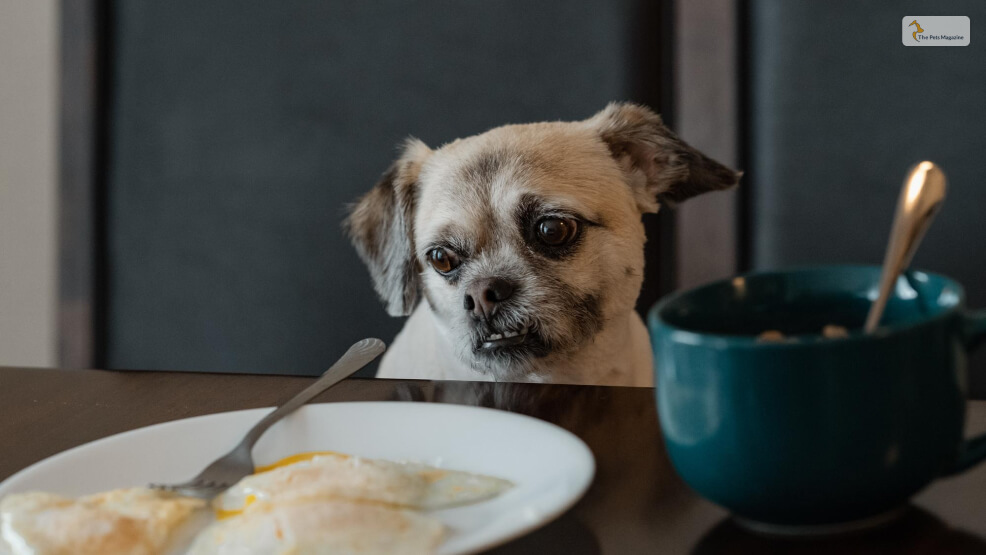
If your dog isn’t eating for some reason, it’s important to watch for signs that they need food. Some clues your pup may be getting hungry include:
- Your dog will start whining or barking, especially around their normal feeding time, which means they are hungry. Your dog has come to expect meals at certain times of day, so they may vocalize when that time passes, and their bowl remains empty.
- Is your dog pawing at their food bowl or the area where you usually feed them? This is your dog’s way of telling you they’re ready to eat and wondering where their meal is.
- Another sign of hunger in dogs is restlessness or pacing. Hunger can make your dog feel unsettled, causing them to wander around looking for food.
- If you see them licking their lips a lot, it means your dog is hungry. This is an instinctual behavior shows your dog is thinking about eating.
- Loss of energy or interest in activities can also be an indication that your dog is hungry. If your dog seems more lethargic than usual and doesn’t want to go for walks or play, it could be a sign their energy levels have dropped due to lack of food.
The longer a dog goes without eating, the more severe these symptoms may become. As a general rule, dogs can survive for up to 5 days without food, but you should still take your dog to the vet right away if they show signs of starvation like weakness, vomiting, diarrhea or collapse. It’s always better safe than sorry in these situations.
The best approach is to stick to a regular feeding schedule for your dog and provide them with a consistent source of nutrition to keep their energy levels up and metabolism working properly. But if your dog does stop eating for some reason, watch them closely for clues that it’s time for their next meal.
What to Do if Your Dog Stops Eating
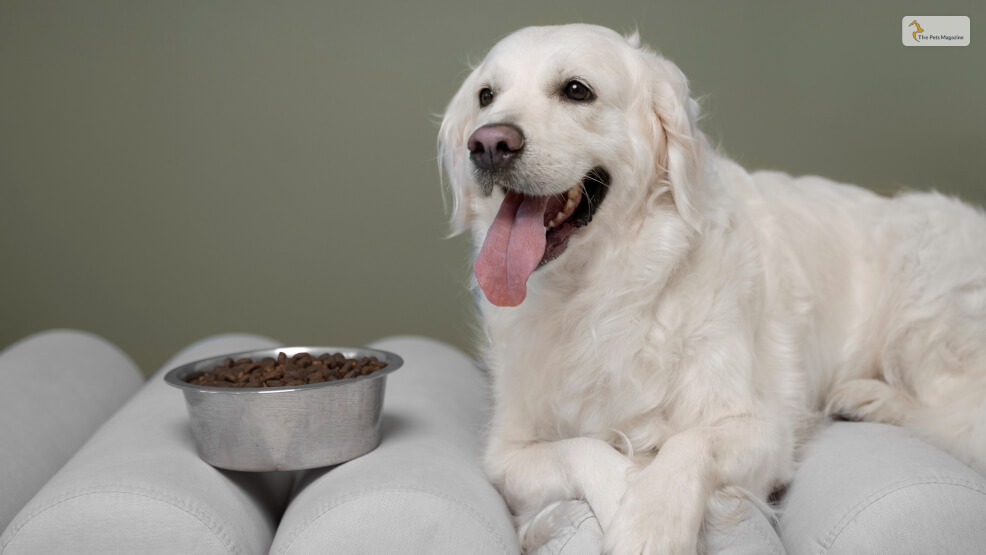
If your dog stops eating, here are some steps you can take:
- Check for Illness: Look for other symptoms like vomiting, diarrhea, or lethargy. If these are present, contact your vet immediately.
- Evaluate Stress and Anxiety: Changes in environment, routine, or loud noises can cause stress, leading to a loss of appetite. Try to maintain a calm and consistent environment.
- Check for Dental Issues: Dental problems can make eating painful. Look for signs like bad breath, drooling, or pawing at the mouth.
- Adjust Feeding Practices: Sometimes, changing the feeding location or schedule can help. You can also try warming up their food or adding a bit of dog-safe broth to make it more appealing.
When to Call the Emergency Vet Immediately
Take your dog to an emergency vet’s clinic right away if:
- Your dog hasn’t eaten or drank anything for 2-3 days. Dehydration and low blood sugar can become life-threatening.
- Your dog is vomiting or has diarrhea in addition to loss of appetite. This can lead to dangerous dehydration or electrolyte imbalances.
- Your dog seems lethargic or weak. Lethargy can be a sign of an underlying medical issue that requires quick treatment.
- There are many other alarming symptoms like seizures, difficulty breathing, or pale gums.
Diagnosis and Treatment for Loss of Appetite at the Vet’s
Some possible causes for loss of appetite that your vet may check for include:
- Digestive issues like pancreatitis, intestinal parasites, or dietary indiscretion (eating something they shouldn’t have)
- Pain from an injury or condition like arthritis that makes eating uncomfortable
- Infection of some kind
- Liver or kidney disease
- Cancer or other illness
Your vet can examine your dog, run blood tests or other diagnostics if needed, and determine the cause of the loss of appetite so they can recommend appropriate treatment to get your dog eating again. The sooner you call, the sooner your vet can get your dog on the road to recovery and prevent potential complications from lack of food.
With prompt veterinary care, most dogs will start eating again within a day or two of treatment. But anytime you notice your dog eating less or not eating at all for more than a couple of days, it’s best to consult your vet to be safe.
Tips and Advice For Encouraging A Dog To Eat
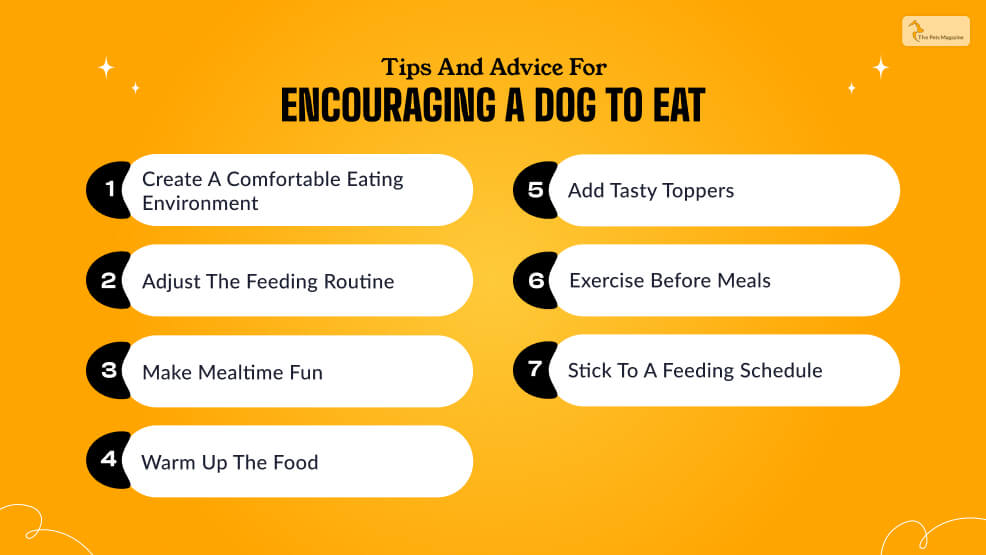
Here are some tips and advice to encourage your dog to eat:
- Create a Comfortable Eating Environment: Ensure your dog feels safe and relaxed during mealtime. If your dog is anxious, try feeding them in a quiet, secluded area. For more social dogs, a more interactive environment might help¹.
- Adjust the Feeding Routine: Sometimes, changing the feeding schedule or location can make a difference. Try feeding your dog at different times or in different places to see what works best.
- Make Mealtime Fun: Incorporate games or use food-dispensing toys to make eating more engaging. This can be especially helpful for active dogs.
- Warm Up the Food: Warming up your dog’s food can make it more appealing by enhancing its smell and flavor.
- Add Tasty Toppers: Adding a bit of dog-safe broth, wet food, or a small amount of cooked meat can make dry kibble more enticing.
- Exercise Before Meals: A good walk or some playtime before meals can stimulate your dog’s appetite.
- Stick to a Feeding Schedule: Consistency can help. Offer food at the exact times each day and remove it after 15-20 minutes if your dog doesn’t eat.
Your dog is a member of your family, so their health should be a top priority. Keep a close eye on their eating and drinking habits and get them checked out if anything seems off. Also dont forget to give them some cuddles and kisses – and maybe a treat! It works wonders sometimes!





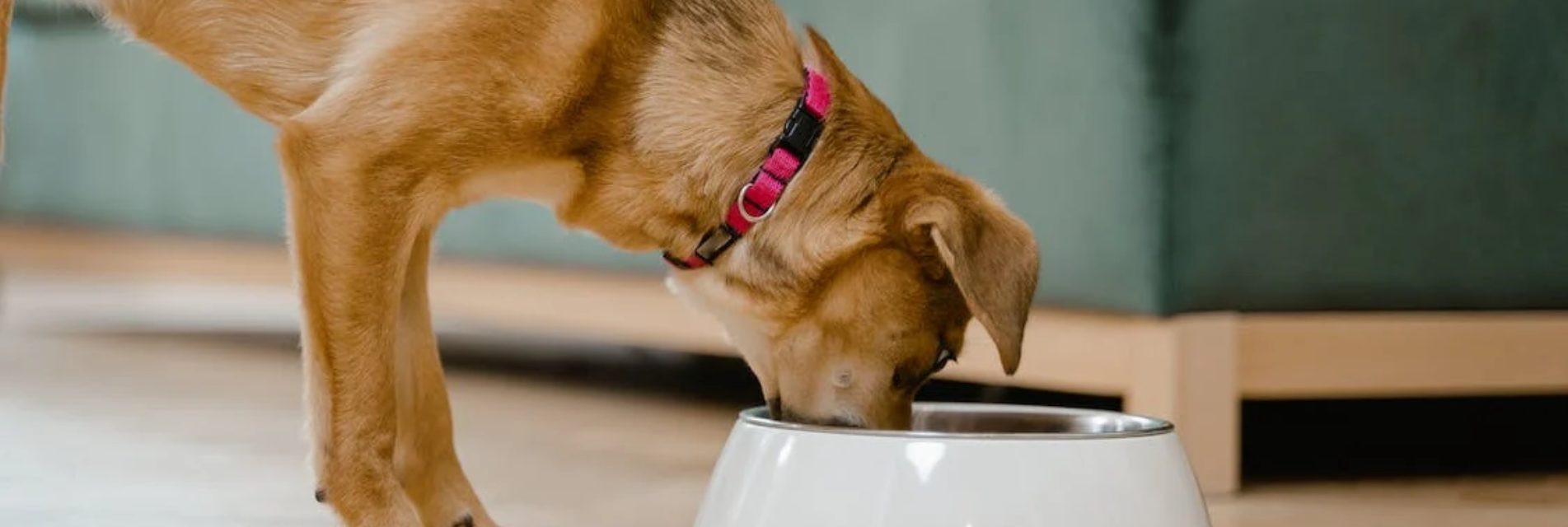

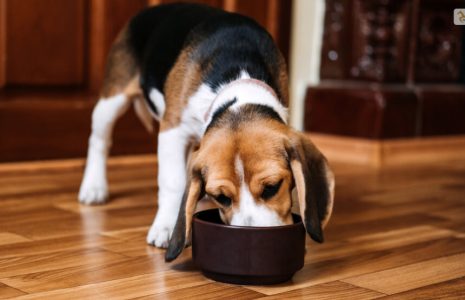
Leave A Comment